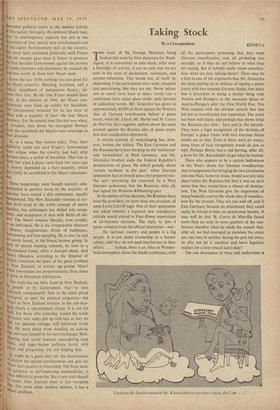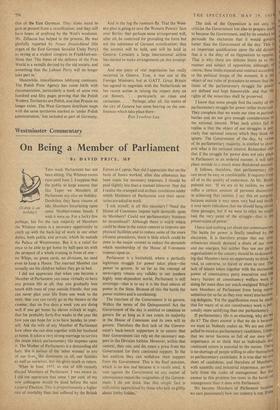Taking Stock
THE work of the Foreign Ministers being broken this week by their departure for Wash- ington, it is convenient to take stock; after over a fortnight of activity, it can be said that we are now in the state of declaration, refutation, and counter-refutation. This would not, of itself, be depressing, if the participants were witty, eloquent and entertaining. But they are not. Never before can so much have been at stake; rarely can a conference have taken place under such torrents of pedestrian words. Mr. Gromyko has given us approximately 40,000 of them against the Western idea of German reunification before a peace treaty, while Mr. Lloyd, Mr. Herter and M. Couve de Murville have together spoken about the same amount against the Russian idea of peace treaty first and reunification afterwards.
A certain amount of mud-slinging has, how- ever, broken the tedium. The East Germans and the Russians have been harping on the 'militarism' and `revanchism' in West Germany, and 'Mr. Gromyko brushed aside the Federal Republic's protestations of peace. He talked grandly about 'certain incidents in the past,' when German spokesmen had professed peace but prepared war- like acts—provoking the comment by a West German spokesman that the Russians, after all, had signed the Molotov-Ribbentrop pact.
In the matter of free elections, the Russians have been the providers, on more than one occasion, of some Lewis Carroll logic. One of their spokesmen was asked whether a reported new conciliatory attitude would extend to Four-Power supervision of all-German elections. The reply to this—I quote verbatim from the official interpreter—was : . . the German country and people is a big people.. It is, not under trusteeship or a former colony, and they do not need interference in their affairs. . .' Indeed, there is an Alice in Wonder- land atmosphere about the whole conference, with all the participants protesting that they want German reunification, and all protesting too strongly, as if they do not believe in what they are saying. But if nobody really wants reunifica- tion, what are they talking about? There may be a hint in one of the arguments that Mr. Gromyko has been putting up in defence of signing a peace treaty with two separate German States; that there was a precedent in doing a similar thing with Austria and Hungary as the successor States to Austria-Hungary after the First World War. The West counter with the obvious remark that this led not to reunification but separation. The point has been well taken, and perhaps that shows what the Russians are after : here and at the summit. They want a legal recognition of the division of Europe; a peace treaty with two German States would see to that. Even if there were no treaty, some form of tacit recognition would do just as well. Perhaps Berlin was a red herring, after all; a lever for Mr. Khrushchev to get what he wanted.
There also appears to be a certain hollowness in the West's desire for German reunification. Any arrangements for bringing the two Germanies into one State, however loose, would scarcely take place unless the Russians felt that it was on such terms that they would have a chance of domina- tion. The West Germans give the impression, of being basically cool to the whole idea of reunifica- tion for the present. They are too well off, and if East Germany became an attachment they could easily be forced to bear an unwelcome burden. It may well be that M. Couve de Murville found more than an echo in most quarters of the con- ference chamber when he made the remark that, after all, we had managed to maintain the status quo one way or another during the past ten years, so why not let it continue and leave legalistic matters for a later (much later) date?
The one dissonance in these odd undertones is 'I suppose Sir David reminded Mr. Khrushehev of our dear cousin, the Czar . . that of the East Germans. They alone stand to gain at present from a reunification; and they still have hopes of profiting by the West's weakness. Mr. Zilliacus has helped in the process. He was gleefully reported by Neues Deutschland (the organ of the East German Socialist Unity Party) as saying at a student congress in Frankfurt-am- Main that The thesis of the defence of the Free World is a swindle devised by the old society, and something that the Labour Party will no longer take part in.'
Meanwhile, miscellaneous lobbying continues. The Polish Press Agency has come forth with documentation, particularly a book of some two hundred and fifty pages proving that the Polish Western Territories are Polish, and that Prussia no longer exists. The West Germans distribute maps with the same territories marked as 'under Polish administration,' but included as part of Germany. And in the fog the rumours fly. That the West- ern plan is going to save the Western Powers' face over Berlin; that perhaps some arrangement will, after all, be contrived for providing the form but not the substance of German reunification; that the summit will be held, and will be held in Geneva. Certainly a large international airline has started to make arrangements on this assump- tion.
And one piece of real negotiation has really occurred in Geneva. True, it was not at the Foreign Ministers, but at GATT. Great Britain has agreed to negotiate with the Netherlands on her recent action in raising the import duty on cut flowers, . particularly on roses and carnations. . . .' Perhaps, after all, the motto of the city of Geneva has some bearing on the con- ferences which take place there : Post Tenebrus Lux.















































 Previous page
Previous page